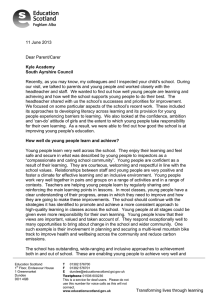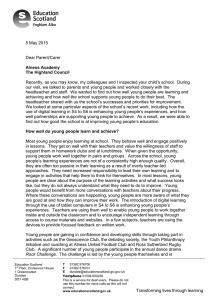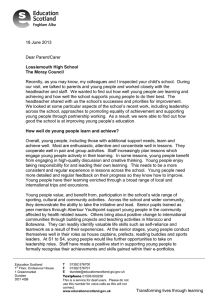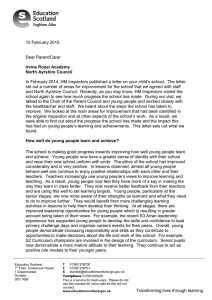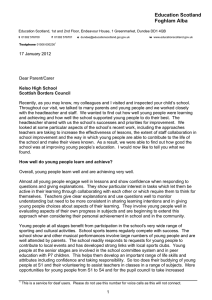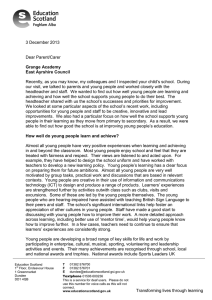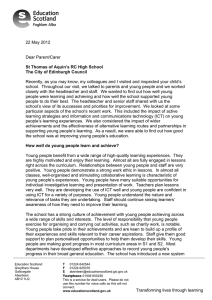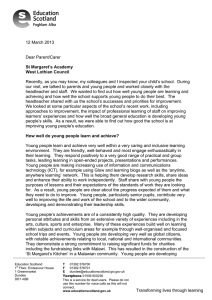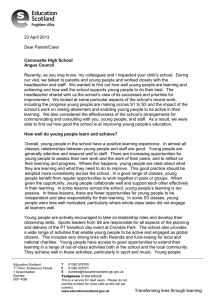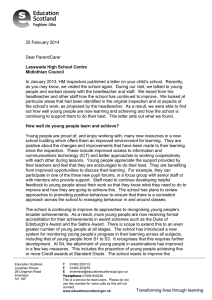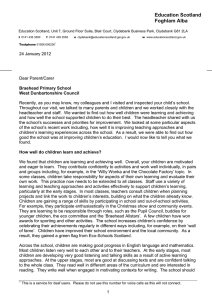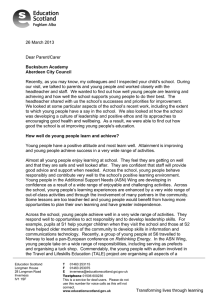5 February 2013 Dear Parent/Carer
advertisement
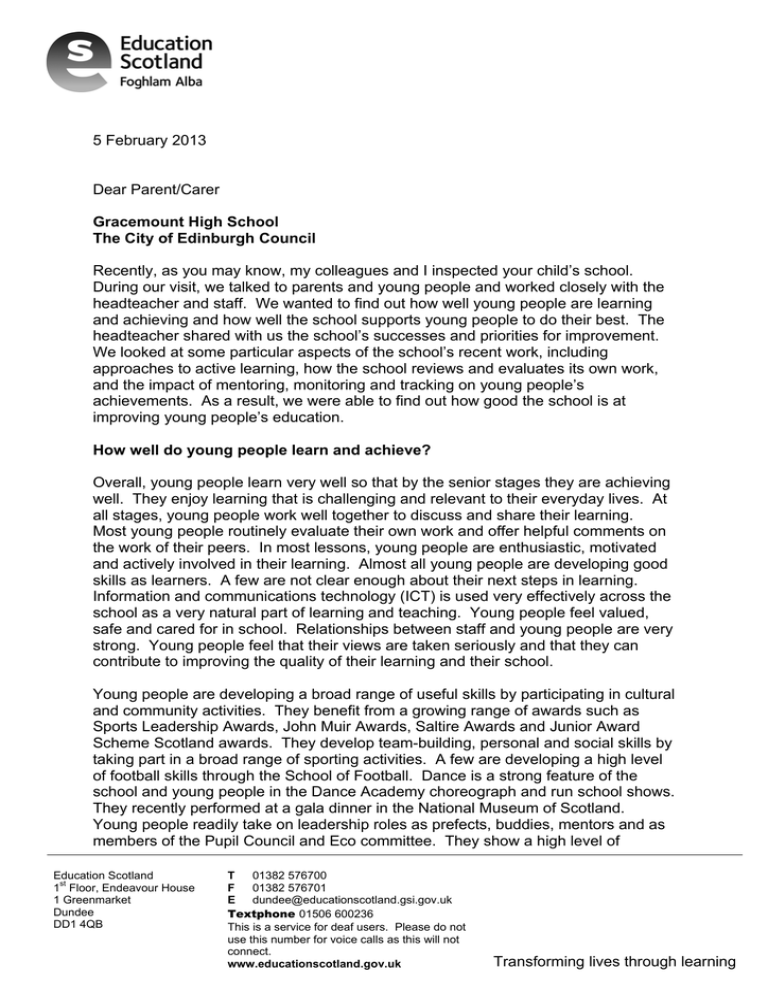
5 February 2013 Dear Parent/Carer Gracemount High School The City of Edinburgh Council Recently, as you may know, my colleagues and I inspected your child’s school. During our visit, we talked to parents and young people and worked closely with the headteacher and staff. We wanted to find out how well young people are learning and achieving and how well the school supports young people to do their best. The headteacher shared with us the school’s successes and priorities for improvement. We looked at some particular aspects of the school’s recent work, including approaches to active learning, how the school reviews and evaluates its own work, and the impact of mentoring, monitoring and tracking on young people’s achievements. As a result, we were able to find out how good the school is at improving young people’s education. How well do young people learn and achieve? Overall, young people learn very well so that by the senior stages they are achieving well. They enjoy learning that is challenging and relevant to their everyday lives. At all stages, young people work well together to discuss and share their learning. Most young people routinely evaluate their own work and offer helpful comments on the work of their peers. In most lessons, young people are enthusiastic, motivated and actively involved in their learning. Almost all young people are developing good skills as learners. A few are not clear enough about their next steps in learning. Information and communications technology (ICT) is used very effectively across the school as a very natural part of learning and teaching. Young people feel valued, safe and cared for in school. Relationships between staff and young people are very strong. Young people feel that their views are taken seriously and that they can contribute to improving the quality of their learning and their school. Young people are developing a broad range of useful skills by participating in cultural and community activities. They benefit from a growing range of awards such as Sports Leadership Awards, John Muir Awards, Saltire Awards and Junior Award Scheme Scotland awards. They develop team-building, personal and social skills by taking part in a broad range of sporting activities. A few are developing a high level of football skills through the School of Football. Dance is a strong feature of the school and young people in the Dance Academy choreograph and run school shows. They recently performed at a gala dinner in the National Museum of Scotland. Young people readily take on leadership roles as prefects, buddies, mentors and as members of the Pupil Council and Eco committee. They show a high level of Education Scotland st 1 Floor, Endeavour House 1 Greenmarket Dundee DD1 4QB T 01382 576700 F 01382 576701 E dundee@educationscotland.gsi.gov.uk Textphone 01506 600236 This is a service for deaf users. Please do not use this number for voice calls as this will not connect. www.educationscotland.gov.uk Transforming lives through learning commitment to issues of equality, with growing numbers now taking a lead in planning the whole school Respect Week. Young people select their own charities to support each year. They have established very strong links with Ogwini school near Durban in South Africa. In addition to raising funds for the school, a few young people benefit from visiting South Africa. Young people’s achievements within and beyond the school are recognised and celebrated very well. At S1 to S3, young people are progressing well through their broad general education. While attainment is lower than national averages, it continues to improve, especially by the end of S6. From S4 to S6, on most key measures in national qualifications, young people are performing in line with or better than schools serving young people with similar needs and backgrounds. Most young people leave school and go on to employment, training or further study. How well does the school support young people to develop and learn? The school motto of ‘Care and Excellence’ gives direction to the work of the school so that young people are supported very well to develop and learn. Very effective arrangements to identify additional support needs ensure young people get the right support when they need it. Across the school, learning tasks and activities are at the right level for most young people. Skilled support for learning staff and pastoral staff ensure that all young people are well supported to progress in their learning. Learning assistants provide well-targeted support to individuals and groups of young people. Staff work very effectively with a range of partners to support young people and their families. The school focuses well on meeting the needs of groups of young people at risk of missing out on their learning. The curriculum is well planned to ensure that young people can progress from school to work, training or further study. Young people are supported well when moving from primary to secondary school. The school’s approach to Curriculum for Excellence is well planned to provide a broad learning experience for young people from S1 to S3. Plans are well in hand for the senior phase. Young people currently in S4 to S6 benefit from a range of options, including some highly personalised programmes such as ‘Access to Success’ and ‘Pathways to Success’. A range of developments promote young people’s literacy skills across different areas of learning. Teachers now need to ensure young people’s numeracy skills and their health and wellbeing are developed more consistently across all areas of their learning. How well does the school improve the quality of its work? All staff are very committed to identifying ways of improving the quality of learning and teaching. They very willingly take part in “mini-reviews” of departments which also involve staff from a neighbouring secondary school. Staff contribute to and lead well-planned professional learning activities. At faculty level and whole-school level, approaches to self-evaluation are rigorous and lead to clear improvements in learning, teaching and achievement. Young people have a strong say in improvements across the school. Parents and partner agencies are also involved in identifying strengths and areas for improvement. Change is very well led by the headteacher and is based on a thorough understanding of the school’s strengths and 2 development needs. The headteacher is supported well by the senior leadership team and faculty leaders. The school is very well placed to build on current strengths and continue improving. This inspection of your school found the following key strengths. • • • • The use of ICT across the school to enhance young people’s learning. The school’s commitment to equality and diversity and ensuring the school meets the needs of all learners. Staff commitment to improvement through sharing good practice with each other, especially through the “mini-reviews”. The headteacher’s leadership of improvement based on rigorous self-evaluation. We discussed with staff and the education authority how they might continue to improve the school. This is what we agreed with them. • • Continue to take forward Curriculum for Excellence, including an increased whole-school focus on numeracy and health and wellbeing, with the aim of further improving young people’s learning experiences. Continue to improve young people’s achievements, supporting them to understand their own strengths and needs as learners. What happens at the end of the inspection? We are satisfied with the overall quality of provision. We are confident that the school’s self-evaluation processes are leading to improvements. As a result, we will make no further evaluative visits in connection with this inspection. During the inspection, we identified aspects of innovative practice which we would like to explore further in order to share the practice with others. As a result we will work with the school and local authority in order to record and share more widely the innovative practice. We will ask the school, in discussion with the local authority, to let parents know the outcome of the innovative practice visits. Douglas Hutchison HM Inspector Additional inspection evidence, such as details of the quality indicator evaluations, for your school can be found on the Education Scotland website at http://www.educationscotland.gov.uk/inspectionandreview/reports/school/primsec/Gr acemountHighSchoolEdinburghCity.asp. If you would like to receive this report in a different format, for example, in a translation please contact the administration team on the above telephone number. If you want to give us feedback or make a complaint about our work, please contact us by telephone on 0141 282 5000, or e-mail: complaints@educationscotland.gsi.gov.uk or write to us addressing your letter to the Complaints Manager, Denholm House, Almondvale Business Park, Livingston EH54 6GA. 3
